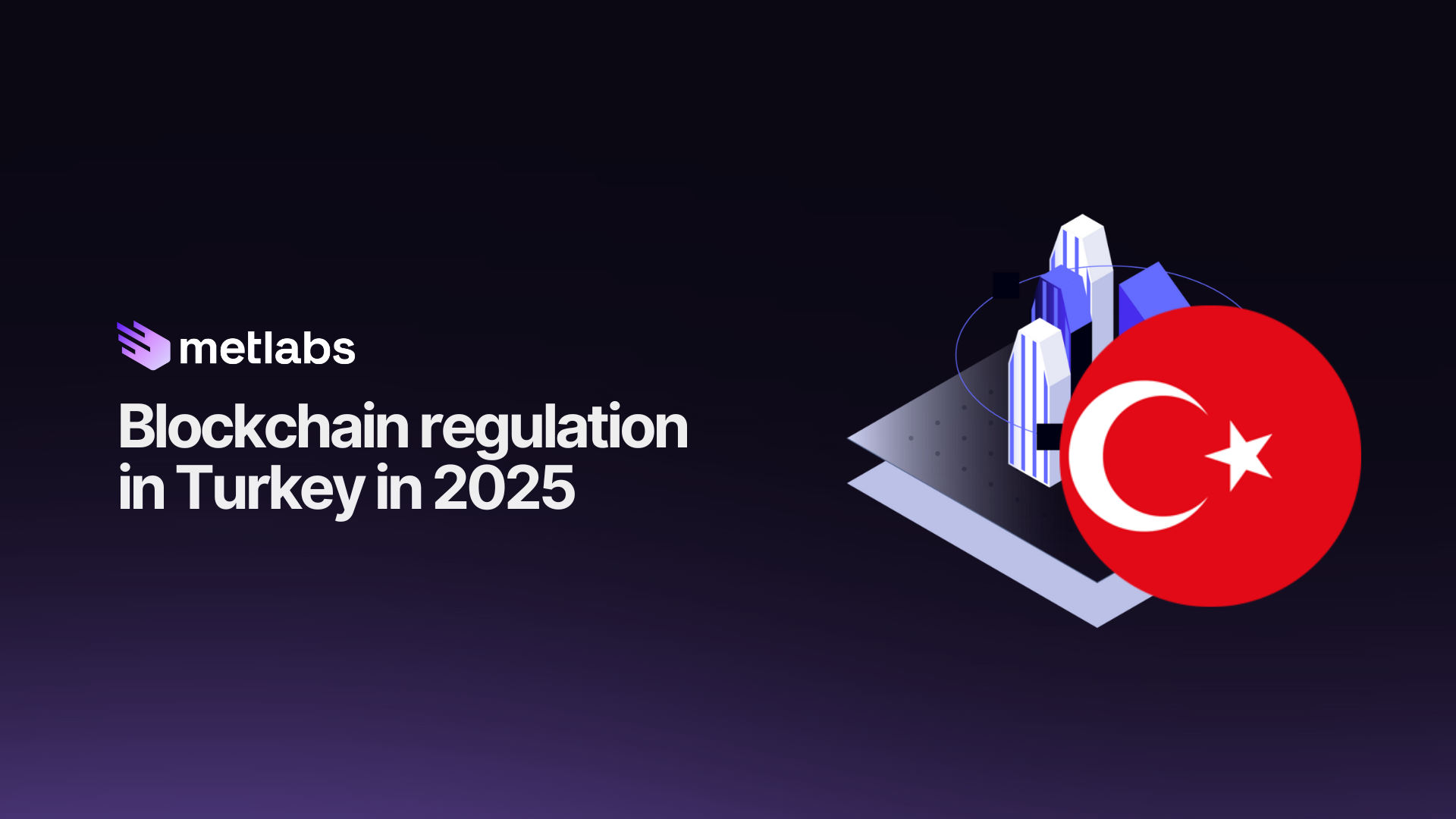The adoption of blockchain technology and asset tokenization is advancing at a rapid pace, but the real engine driving its global development is the existence of a clear, consistent and innovation-friendly legal framework.
Some countries have already established themselves as regulatory benchmarks, establishing specific rules for cryptoassets, DLT infrastructures and token issuance with legal backing. In this article we show you relevant information about blockchain regulation in Turkey, which you can use as a guide if you are looking to operate internationally or evaluate different strategic locations.

Current legislation on blockchain and virtual assets in Turkey.
Capital Markets Law No. 6362
Amended by Law No. 7518 in 2024, it establishes the comprehensive framework for CASP regulation in Turkey, under the supervision of the Capital Markets Board(SPK). It requires mandatory licensing, capital requirements, governance, transparency and investor protection, and introduces criminal penalties for unauthorized trading and fraud.
Regulation No. 31456 of the Central Bank of Turkey
It expressly prohibits the use of cryptoassets as a means of payment in Turkey. Issued by the Central Bank, it prevents cryptocurrencies from being used directly or indirectly for the acquisition of goods and services, nor through payment platforms or electronic money issuance. It does not prohibit holding or exchange, but limits their functionality.
MASAK AML/CFT requirements
MASAK requires all virtual asset service providers (CASPs) to register and comply with customer identification obligations (KYC), transaction monitoring, suspicious transaction reporting and internal audits.
CASP Licensing and Operation Regulations
Specific regulations for obtaining and maintaining CASP licenses, including exchanges, custodians and wallet providers, were published in March 2025. The framework covers technology infrastructure, risk management, withdrawal and transfer limits, and periodic reporting, in addition to requiring AML/KYC compliance and technology auditing by TÜBİTAK.
Digital Assets Bill
Currently under parliamentary review, this project seeks to establish a comprehensive legal framework for the issuance, trading and custody of digital assets, with differentiated licenses, token classification and centralized registry of issuers. It provides for shared supervision between the SPK and MASAK, and the creation of a national registry of authorized platforms.
SPK regulatory framework for security tokens (draft)
The SPK has published draft guidelines for the issuance and trading of security tokens, requiring issuers to comply with traditional capital market requirements: prospectus, authorization, custody by regulated entities and trading restrictions. Platforms must register as organized markets or authorized platforms.
Blockchain and DLT regulatory sandbox (under development)
Turkey develops a regulatory sandbox focused on blockchain and DLT applications, including asset tokenization and traceability, enabling supervised experimentation before full licensing comes into force. Formal deployment is planned for 2025.
Tokenization makes it possible to digitally represent real-world assets through blockchain, but for it to have legal value, a regulatory framework recognizing this operation is essential. Turkey adopts its own approach, establishing specific rules for the issuance, custody or trading of tokens. In this block we explain how asset tokenization is regulated from a legal point of view, taking an advanced jurisdiction such as Turkey as an example.
Regulation of asset tokenization in Turkey
Turkey allows the tokenization of financial and non-financial assets under the new regulatory framework of the Capital Markets Law No. 6362 and its implementing regulations. The issuance, custody and trading of tokens representing securities, commodities or economic rights requires prior authorization from the SPK and compliance with governance, transparency and investor protection requirements, bringing operations on par with those of traditional markets.
Tokens that do not constitute financial instruments are subject to registration, traceability and AML/KYC compliance obligations, with special attention to identity verification and transfer monitoring. The regulation prohibits the operation of unauthorized platforms and sets limits for stablecoins and digital asset transfers.
The National Blockchain Strategy and regulatory sandbox under development will facilitate controlled experimentation with tokenization models, allowing solutions to be validated prior to commercial deployment. In addition, Turkey is exploring the tokenization of strategic assets such as boron, with proposals to create digital exchange platforms in Istanbul.
Regulatory agencies and authorities for digital assets in Turkey
Capital Markets Board of Turkey (SPK)
The SPK is the main authority in charge of regulating and supervising the digital asset sector in Turkey. It has exclusive powers to grant licenses, supervise exchanges, custodians and other CASPs. In addition, it sets capital requirements, verifies the suitability of directors and shareholders, and sanctions non-compliance.
Scientific and Technological Research Council of Turkey (TÜBİTAK)
TÜBİTAK collaborates with SPK in the technical supervision and auditing of the crypto sector. Its main role is to establish guidelines for CASP audits, as well as to receive and manage a portion of the annual regulatory fees paid by the platforms. It strengthens the technological infrastructure and cybersecurity of the ecosystem, in line with international best practices.
Financial Crime Investigation Unit (MASAK)
MASAK the national financial intelligence unit responsible for the prevention of money laundering and terrorist financing in Turkey. It monitors CASPs’ compliance with AML/CFT obligations, receives suspicious transaction reports and coordinates international cooperation on financial crimes related to digital assets.
Central Bank of Turkey
Regulates monetary and financial policy, including the development of the digital lira. Although it bans the use of cryptoassets as a means of payment from 2021, it monitors their macroeconomic impact and participates in regulatory initiatives alongside the SPK. It leads the CBDC pilot project and sets guidelines for the interaction of digital assets with national systems.
Launching a business based on digital assets requires more than just technology: it is also necessary to comply with legal requirements such as licensing, registration and regulatory obligations. These conditions ensure that the business model is viable and sustainable over time, and that it meets transparency and fraud prevention standards. In this section we explore what licenses are typically required and what compliance criteria blockchain companies operating in Turkey must follow.

What licenses and requirements are needed to trade cryptoassets in Turkey?
CASP License
Any company wishing to operate as an exchange, custodian or crypto service provider in Turkey must obtain a license issued by the SPK. Requirements include minimum capital, incorporation as a joint stock company, transparency in shareholding structure, suitability of directors and compliance with strict operational and security standards. Foreign companies must also meet these requirements to operate in the country.
AML/CFT compliance
CASPs are required to implement comprehensive money laundering and terrorist financing prevention procedures, including identity verification for transactions over 15,000 Turkish Lira, transaction monitoring, suspicious transaction reporting to MASAK and risk management on unregistered wallets. Failure to comply may result in sanctions, suspension of operations or license revocation.
Other regulatory requirements
Platforms must have robust governance structures, risk management policies, cybersecurity systems and regular audits, in accordance with TÜBİTAK guidelines. They are required to maintain detailed records of all transactions, apply limits and controls to stablecoin transfers and comply with withdrawal waiting periods, especially for new accounts.
Are you exploring developing your blockchain project in Turkey?
At Metlabs we help companies like yours and offer comprehensive accompaniment in the development of blockchain projects and tokenization of assets such as real estate, carbon credits, commodities, intellectual property, financial instruments, franchises and more, fully aligned with blockchain regulation in Turkey and international regulatory standards.
Contact us and find out how we can help you meeting all your business model needs, from technical validation and structuring to design, development and implementation of custom blockchain solutions, ready to scale from day one.



